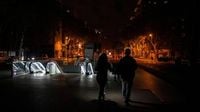In a recent flash survey conducted by the Centro de Investigaciones Sociológicas (CIS), nearly 60% of Spaniards expressed dissatisfaction with the government’s response to the massive blackout that plunged the Iberian Peninsula into darkness on April 28, 2025. The survey, published on May 3, 2025, reveals a significant public outcry regarding the lack of timely and sufficient information from the government during the crisis.
The blackout, which affected millions across Spain and parts of Portugal, prompted widespread confusion and concern. According to the CIS data, 59.6% of respondents deemed the information provided by the Spanish government as "insufficient." Only 28.4% felt the communications were adequate, while 8.2% could not assess the situation. This sentiment highlights a growing frustration among citizens who were left in the dark—both literally and figuratively—about the causes and duration of the outage.
Among those who criticized the government’s handling of the situation, 38.4% called for more clarity regarding the causes of the blackout, while 26.3% wanted updates on when electricity would be restored. Additionally, 24.1% felt that the government should have acted more quickly in providing information. Notably, President Pedro Sánchez did not address the public until nearly six hours after the initial outage, which likely contributed to the perception of inadequate communication.
In the aftermath of the blackout, the Spanish government swiftly established two working groups to investigate the incident—one focusing on the electrical system and the other on cybersecurity. The Minister for Ecological Transition, Sara Aagesen, led the second meeting of the committee on the same day the survey was released. During this meeting, Beatriz Corredor, the president of Red Eléctrica, ruled out the possibility of a cyberattack, stating that the cause was likely a technical failure.
While the survey indicated a significant portion of the population felt uninformed, it also provided insights into how citizens coped during the blackout. A remarkable 62.1% of respondents reported missing electricity for essential tasks such as cooking and preserving food and medications. Additionally, 55.5% lamented the inability to use their mobile phones, and 26% missed access to the internet and social media.
Despite the chaos, the survey revealed that 78% of respondents reported not feeling fear during the blackout. However, those who did experience fear were predominantly women (29.1%) and younger individuals aged 18 to 34 years. The survey also highlighted that 52.5% of respondents felt "very or quite affected" by the outage, while 46% stated they were affected "little or not at all." This indicates a mixed response to the blackout's impact on daily life.
Interestingly, the survey also reflected on the public’s preparedness for emergencies. Over half of the respondents (53.5%) recalled the European Union’s recommendation to have an emergency kit at home, yet only 34.3% reported having one prior to the blackout. This gap suggests a need for increased public awareness and preparation for future emergencies.
Radio emerged as a critical source of information during the crisis, with 62.1% of respondents tuning in for updates. Radio Nacional de España (RNE) was the most listened to station, capturing 21.3% of the audience, followed by Cadena SER (16.7%) and Cadena COPE (14.5%). A staggering 89.1% of those who listened to the radio during the blackout rated the information received as "very good" or "good," underscoring the medium's importance in crisis communication.
In terms of voting preferences following the blackout, the survey indicated that 19% of respondents would vote for the ruling Socialist Workers' Party (PSOE), while the Popular Party (PP) garnered 15%. This data suggests that the blackout has not significantly harmed the government’s standing among voters, as the PSOE continues to maintain a lead over the PP.
Looking ahead, many citizens believe that modernizing the electrical grid is essential to prevent future outages, with 44.2% supporting this view. Furthermore, 41.7% of respondents advocate for increased investment in critical infrastructure, and 32.6% suggest enhancing the number of generators in public services.
The survey results also reflect a divided opinion on the necessity of creating a specific Ministry for emergencies. While 47.2% see it as necessary, 49.3% do not agree. These findings highlight the ongoing debate about how best to manage and prepare for emergencies in Spain.
As Spain continues to grapple with the implications of the blackout, the government’s response will be under scrutiny as they work to restore public trust and ensure that such a crisis does not occur again. The establishment of the joint working group with Portugal to investigate the causes of the blackout and implement preventive measures marks a step towards addressing these concerns.
In Portugal, a separate survey revealed that only 19% of Portuguese citizens approved of their government's handling of the crisis, indicating a broader regional dissatisfaction with official responses to the blackout.
As the dust settles on this unprecedented event, the focus will remain on how effectively the Spanish government can learn from this experience and improve its communication and infrastructure to better serve its citizens in future emergencies.



